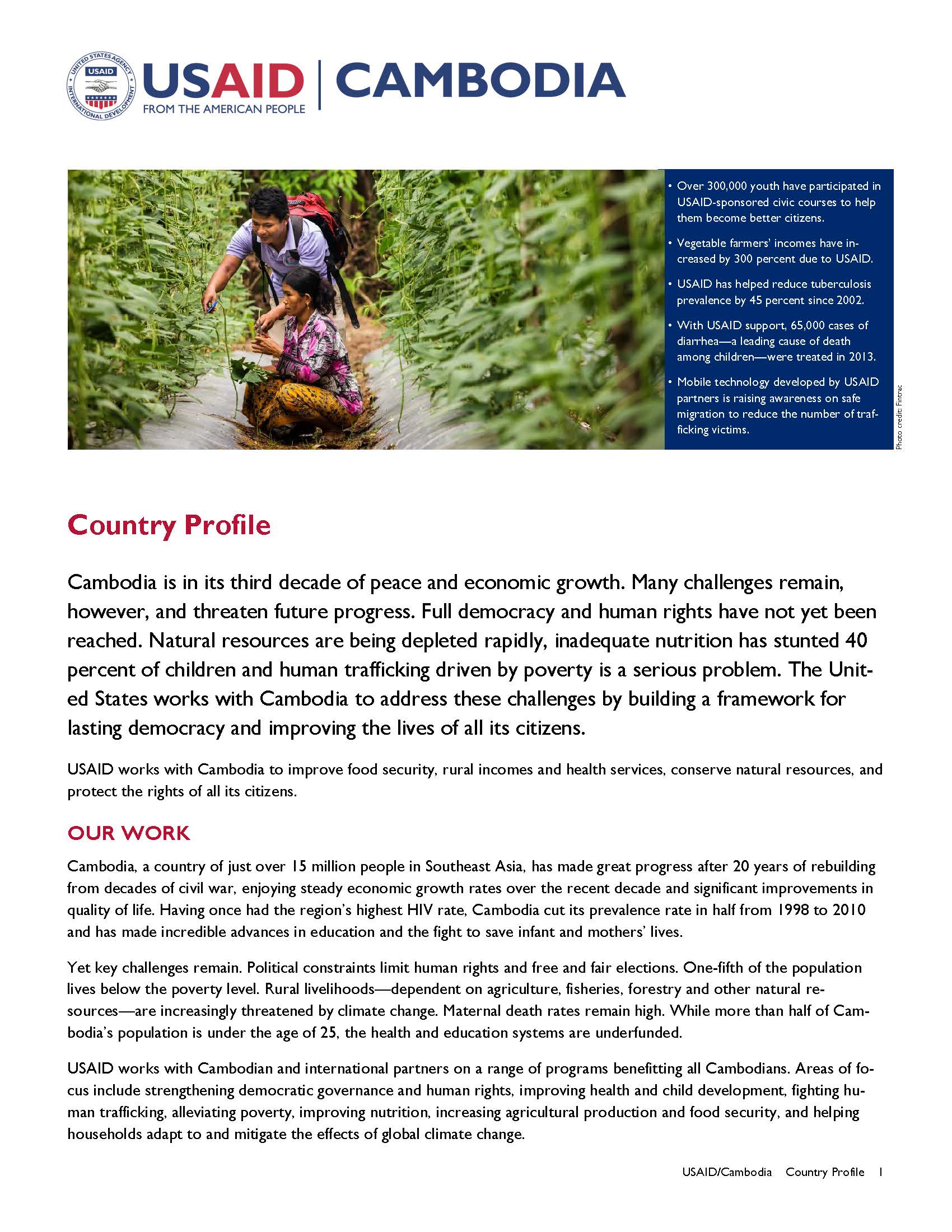![]() (318k) Cambodia Country Profile
(318k) Cambodia Country Profile
Cambodia, a country of just over 15 million people in Southeast Asia, has made great progress after 20 years of rebuilding from decades of civil war, enjoying steady economic growth rates over the recent decade and significant improvements in quality of life. Having once had the region’s highest HIV rate, Cambodia cut its prevalence rate in half from 1998 to 2010 and has made incredible advances in education and the fight to save infant and mothers’ lives.
Yet key challenges remain. Political constraints limit human rights and free and fair elections. One-fifth of the population lives below the poverty level. Rural livelihoods—dependent on agriculture, fisheries, forestry and other natural resources—are increasingly threatened by climate change. Maternal death rates remain high. While more than half of Cambodia’s population is under the age of 25, the health and education systems are underfunded.
USAID works with Cambodian and international partners on a range of programs benefitting all Cambodians. Areas of focus include strengthening democratic governance and human rights, improving health and child development, fighting human trafficking, alleviating poverty, improving nutrition, increasing agricultural production and food security, and helping households adapt to and mitigate the effects of global climate change.
• Over 300,000 youth have participated in USAID-sponsored civic courses to help them become better citizens.
• Vegetable farmers’ incomes have increased by 300 percent due to USAID.
• USAID has helped reduce tuberculosis prevalence by 45 percent since 2002.
• With USAID support, 65,000 cases of diarrhea—a leading cause of death among children—were treated in 2013.
• Mobile technology developed by USAID partners is raising awareness on safe migration to reduce the number of trafficking victims.
DEMOCRACY, HUMAN RIGHTS AND GOVERNANCE
USAID works with Cambodia’s government and civil society to strengthen key political and civil liberties, increase citizens’ participation in the political process, and combat human trafficking. We support organizations that advocate for democracy and fair elections and protect the rights of vulnerable populations. USAID’s assistance has resulted in an expansion of citizen expression and media attention to critical land and environmental issues. Women’s political participation is increasing, a result of local town hall meetings, debates and training of National Assembly candidates.
FOOD SECURITY AND ENVIRONMENT
Under the U.S. Government’s Feed the Future and Global Climate Change initiatives, USAID helps 70,000 farm families produce more by introducing improved practices and crop varieties, especially different vegetables, which increases incomes for growers by 300 percent. Our programs enable farmers to better adapt to climate change by teaching them to grow crops with short growing cycles to help them quickly recover after floods may destroy a crop, and we work with the private sector to provide better advice and agricultural inputs to farmers. USAID also reduces the negative impacts of climate change by supporting local communities’ efforts to conserve forests, which are some of Southeast Asia’s largest.
GLOBAL HEALTH
Under the U.S. Government’s Global Health Initiative, USAID works to improve maternal and child health as well as reduce the prevalence of infectious diseases by helping Cambodia improve health service delivery, enhance clinical skills and expand community outreach. With USAID’s help, nearly 3 million poor Cambodians now receive health services free of charge through a health financing system supported by the Cambodian government and other donors. USAID is also helping contain the spread of drug-resistant malaria and tuberculosis and improve nutrition among children. Through the U.S. President’s Emergency Plan for AIDS Relief, USAID helped Cambodia treat almost 50,000 people and test over 80,000 pregnant women for HIV, supporting Cambodia’s goal of achieving an AIDS-free generation by 2020.
EDUCATION
USAID improves the quality of basic education by improving teaching and management skills. We have helped more than 81,000 primary and secondary students receive better quality basic education. Also, USAID developed 30 teaching modules in skill areas such as aquaculture and gardening to increase the value of education to parents and children.
KNOWLEDGE AND INNOVATION
USAID is boosting Cambodian innovation and helping to spread global development knowledge. We support technologists and entrepreneurs in creating new solutions to engage citizens and improve education and health through, for example, mobile phone networks and social media outlets.








Comment
Make a general inquiry or suggest an improvement.